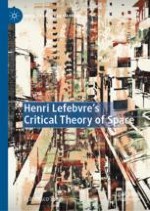2020 | OriginalPaper | Buchkapitel
2. The Lefebvrian Lexicon
verfasst von : Francesco Biagi
Erschienen in: Henri Lefebvre's Critical Theory of Space
Aktivieren Sie unsere intelligente Suche, um passende Fachinhalte oder Patente zu finden.
Wählen Sie Textabschnitte aus um mit Künstlicher Intelligenz passenden Patente zu finden. powered by
Markieren Sie Textabschnitte, um KI-gestützt weitere passende Inhalte zu finden. powered by
